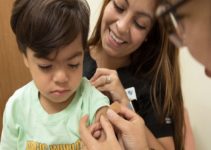There had been quite a squabble going on because of the booster shots. The government is in confusion about what to do and that is making the government officials work and act in an awkward manner. This is indeed not good for the nation. Currently, there had been some problem with the CDC Director over the matter of the booster shots.
CDC which is also known as the United Arab Centers for Disease Control and Prevention had been in trouble because of the report of the director doing something that did not please the public a lot. Director Dr. Rochelle Walensky denied overruling an agency advisory committee.

This was however reported before that he had reportedly refused to endorse Pfizer-BioNTech booster shots that have been made and also got the FDA approval. This happened during a White House briefing on a Friday afternoon.
“I want to be very clear on this matter. The fact that I did not ever overrule an advisory committee,” Walensky said in a statement or rather more of a briefing. She was alongside President Joe Biden’s chief medical adviser, Dr. Anthony Fauci.
Walensky made sure that they are unable to understand that she had been paying a lot of attention to the entire process. She also noted the fact that she had listened very carefully and very intently to both the U.S. Food and Drug Administration (FDA) advisory committee as well as to the group of scientists. She is making sure that we understand the current situation properly.
“I am not going to lie, I listened to all of the comments that had been made on the votes, and this particular one was a very scientific close call,” she said. “I think you could tell by looking very closely at the duration of the meeting and also all along the discussions that had been going on. This proves that this was a scientific close call.”
We did it in a very public manner with no secrecy, we were very transparent, and we did it all around and very carefully with some of the best scientists in the country,” she added to her statement.
That is all that had been going on regarding the matter of the booster shots. Some people are in favor while some are not, and many are uncertain. This is a whole lot of a mess that had been made. We will keep you updated.


